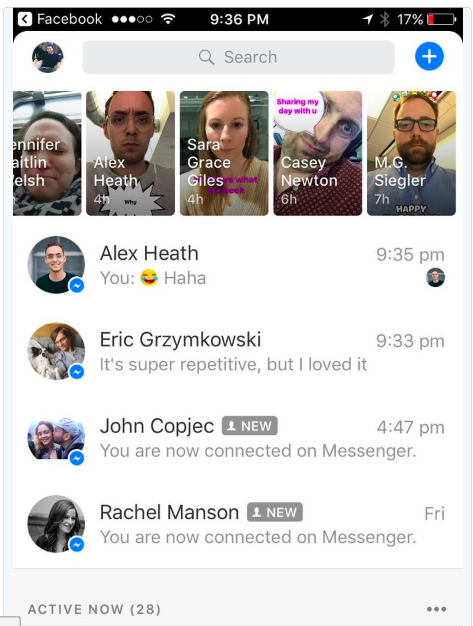What does 2017 hold for your online life? No matter old you are, it probably will involve Facebook a lot. The social networking giant has created a number of features and services have made it close in on two billion registered users. This is an unprecedented success that the company has achieved. That’s only because the company has always been sensible of investing in the right directions.
Two of its acquisitions i.e. WhatsApp and Instagram have globally reached to billions of users around the world. Globally on WhatsApp, more than a billion users are active on the messaging service whereas Instagram reached 500 million users last summer. The number of users is increasing predominantly in the emerging markets. Through Facebook’s outreach, it has become difficult for the other social networking websites to survive as it has set an extremely high standard for all.
My god this was a bad idea. I’m certain Stories in my banking app are next.
— M.G. Siegler (@mgsiegler) March 10, 2017
FB Messenger went from being a great texting app to this confusing garbage pic.twitter.com/MrJvSOvPY8
— Steve Kovach (@stevekovach) March 10, 2017
Despite such big achievements, Facebook seems to be inspired with SnapChat itself. Once it tried to acquire the company for $3 billion but when failed to do so, the company starting cloning its core features. Now, Facebook seems to be focusing a lot on its Instagram service which is affecting SnapChat both in terms of users as well as influencers. The response of various SnapChat clones by Facebook is always a little surprising but this time it seems Facebook has gone over the board for benefitting from its cloning opportunities. Recently, the company launched Messenger Day for its Messenger service and added a similar feature to its messaging service WhatsApp last month.
WhatsApp and Instagram originated as two of the SnapChat’s clones but today their popularity is far better than the original features. The executive of the SnapChat clones denied of the Messenger Day as a copy. This feature was considered to attract a lot of audience in the coming days.
But right now it seems to be lacking the usage of it, despite it sits on the top of the screen with no option to hide or remove it. It’s because Facebook has mistakably has made such people responsible for this feature who lack the complete knowledge SnapChat’s photo sharing service. The constant prompts keep on appearing while sharing an image inside a Messenger chat window that led to embarrassing accidental postings. This feature has been launched across the US but is not proving very much encouraging.
SnapApp:
This is not just happening with Facebook’s Messenger, the experience of WhatsApp is coming as a disappointment. This service is constantly being used by the young lot who are reportedly ditching this service for places where their parents are not. For many of the people living in India or other countries, WhatsApp is used as a primary communication application. They are using the new SnapChat Status feature. It’s still unclear why they are using the service for posting self-destructing images. Despite everything, WhatsApp is still a dominant chat in the emerging markets. The WhatsApp photos are viewable by anyone who has a phone number of the other person but WhatsApp Status is still a novelty among many people.
Despite the criticism, both the services are appreciated for keeping the simplicity for messaging. These apps provide an easy to connect to family and friends. These have their main focus on images which is the basic reason of being cloned from SnapChat. Facebook’s love for innovation knows no bounds; the company is testing business service inside WhatsApp. This service is being in India and the Middle East unofficially. The company has recently altered its bot program for focusing on app-like interfaces that have been a huge success for China’s WeChat.
Facebook might face criticism for its SnapChat cloning inside its messaging service WhatsApp and Messenger and it seems an unnecessary risk to take when it has a lot to offer with its own messaging services.




